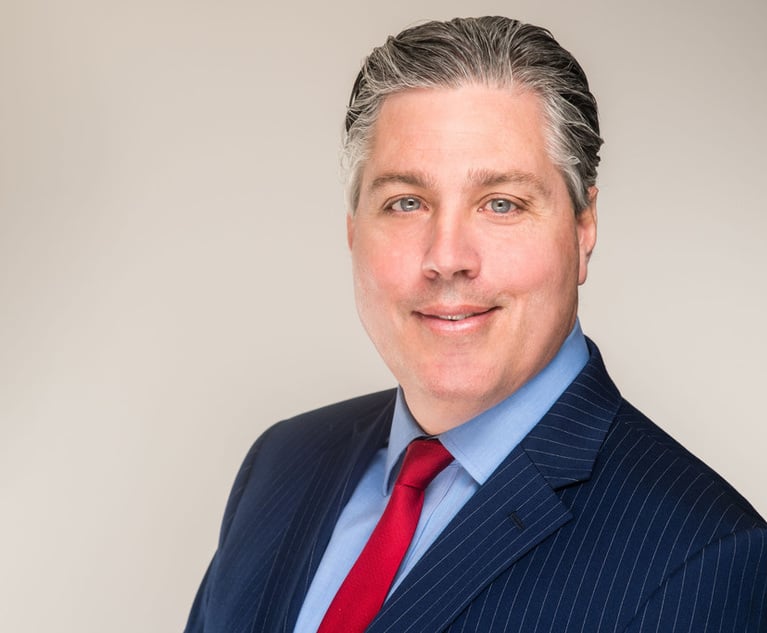In Two Rulings in One Day, Pa. Justices All but Stamp Out 'Birchfield' Retroactivity
Halloween was a scary day for DUI defense lawyers.
November 07, 2019 at 03:52 PM
5 minute read
 Photo: Shutterstock
Photo: Shutterstock
Halloween was a scary day for DUI defense lawyers.
In two decisions released Oct. 31, the Pennsylvania Supreme Court upheld lower court rulings severely hampering DUI defendants' ability to retroactively apply the U.S. Supreme Court's landmark 2016 decision in Birchfield v. North Dakota, which barred criminal penalties for suspects who refuse to submit to warrantless blood draws.
In Commonwealth v. Olson, the justices ruled 5-2 that Birchfield introduced a procedural, rather than substantive, rule change and therefore did not apply retroactively.
"Because Birchfield did not set forth a 'categorical constitutional guarantee' that places criminal punishment for blood test refusal 'altogether beyond the state's power to impose,' but, rather, established a procedural requirement that, once satisfied, authorizes that punishment, the Birchfield rule is not substantive," Justice David Wecht wrote for the majority in Olson, explaining that, under Birchfield, warrantless blood draws are still valid if exigent circumstances are present.
The same day, in Commonwealth v. Hays, the court ruled 4-3 that Birchfield should not apply to DUI cases that were still pending at the time the U.S. Supreme Court rendered its decision unless the defendant had challenged their consent to a warrantless blood draw at every stage of the litigation.
In reaching this conclusion, the majority relied on its 1983 ruling in Commonwealth v. Cabeza, which held that "where an appellate decision overrules prior law and announces a new principle, unless the decision specifically declares the ruling to be prospective only, the new rule is to be applied retroactively to cases where the issue in question is properly preserved at all stages of adjudication up to and including any direct appeal."
Justice Sallie Updyke Mundy, writing for the majority in Hays, rejected the urging of amicus curiae to overturn Cabeza in favor of creating a new rule that would "'consider an issue preserved when it is raised in a timely fashion after the creation of the new rule on which it is grounded.'"
"While this invitation has some appeal, appellant has failed to argue or persuade this court that Cabeza should be overruled, and this court declines to revisit this well established law at this time," Mundy said. "Instantly, appellant failed to assert at or before trial that his consent was coerced."
Both cases had several concurring and dissenting opinions attached.
In Olson, Wecht's majority opinion was joined by Justices Max Baer, Debra Todd and Kevin Dougherty, but Mundy issued a concurring opinion and both Chief Justice Thomas Saylor and Justice Christine Donohue filed dissenting opinions.
Mundy said she wrote separately "to distance myself from the majority's discussion casting doubt on what it has indicated is the 'potential applicability' of the exigent circumstances exception to the warrant requirement in the DUI arena."
In his dissent, Saylor said he agreed with courts in Minnesota, New Mexico and North Dakota that have determined Birchfield to be a substantive rule change.
"In my judgment, the default rule should be that Birchfield applies retroactively, subject to other material considerations such as waiver," Saylor said.
Donohue penned a one-sentence dissent, saying, "I join the dissenting opinion authored by Chief Justice Saylor in all respects other than the last paragraph, which addresses the possibility of waiver of a Birchfield claim."
Those differing viewpoints on the waiver issue help explain why the majority in Hays looked slightly different than the one in Olson.
In Hays, Mundy was joined in the majority by Saylor, Baer and Dougherty.
But Saylor also filed a concurring opinion to note that he "would be receptive to considering a moderate adjustment" to the court's rigid stance on issue preservation in cases where a new ruling has overturned a prior decision by a court of last resort, so as not to reward litigants for making meritless arguments that run contrary to established precedent.
Donohue, meanwhile, filed a dissenting opinion, joined by Todd and Wecht. pointing to the Supreme Court's 2017 ruling in Commonwealth v. Cousar that "'counsel cannot be deemed ineffective for failing to predict changes in the law.'"
"It seems incongruous to require trial counsel to be so prophetic as to predict changes in the law in order for her client to be entitled to benefit from a new rule, but then find that she is not ineffective for failing to do so," Donohue said. "In my view, the law cannot both deprive a defendant of a new rule of law announced during the pendency of direct review because counsel waived its application by failing to object and also find that counsel is not ineffective for failing to preserve the issue. This completely closes the courtroom door to a defendant, and there is no other area of the law that removes any avenue for relief for a criminal defendant."
Lycoming County District Attorney Kenneth Osokow did not return a call for comment on the ruling in Hays. Defendant Kirk Hays' attorney, Timothy Barrouk of The McShane Firm in Harrisburg, also did not return a call for comment.
Deputy Attorney General Hugh Burns argued the case for the state in Olson. A spokesperson for the office did not respond to a request for comment. Counsel for defendant Jeffrey Olson, David T. Leake of Somerset, also did not return a call for comment.
This content has been archived. It is available through our partners, LexisNexis® and Bloomberg Law.
To view this content, please continue to their sites.
Not a Lexis Subscriber?
Subscribe Now
Not a Bloomberg Law Subscriber?
Subscribe Now
NOT FOR REPRINT
© 2025 ALM Global, LLC, All Rights Reserved. Request academic re-use from www.copyright.com. All other uses, submit a request to [email protected]. For more information visit Asset & Logo Licensing.
You Might Like
View All
Saul Ewing Loses Two Partners to Fox Rothschild, Marking Four Fla. Partner Exits in Last 13 Months
3 minute read


Feasting, Pledging, and Wagering, Philly Attorneys Prepare for Super Bowl
3 minute readTrending Stories
- 1Ex-Starbucks GC Exiting Latest Role, Will Get Severance
- 2Family Law Special Section 2025
- 3We Must Uphold the Rights of Immigrant Students
- 4Orrick Picks Up 13-Lawyer Tech, VC Group From Gunderson Dettmer
- 5How Alzheimer’s and Other Cognitive Diseases Affect Guardianship, POAs and Estate Planning
Who Got The Work
J. Brugh Lower of Gibbons has entered an appearance for industrial equipment supplier Devco Corporation in a pending trademark infringement lawsuit. The suit, accusing the defendant of selling knock-off Graco products, was filed Dec. 18 in New Jersey District Court by Rivkin Radler on behalf of Graco Inc. and Graco Minnesota. The case, assigned to U.S. District Judge Zahid N. Quraishi, is 3:24-cv-11294, Graco Inc. et al v. Devco Corporation.
Who Got The Work
Rebecca Maller-Stein and Kent A. Yalowitz of Arnold & Porter Kaye Scholer have entered their appearances for Hanaco Venture Capital and its executives, Lior Prosor and David Frankel, in a pending securities lawsuit. The action, filed on Dec. 24 in New York Southern District Court by Zell, Aron & Co. on behalf of Goldeneye Advisors, accuses the defendants of negligently and fraudulently managing the plaintiff's $1 million investment. The case, assigned to U.S. District Judge Vernon S. Broderick, is 1:24-cv-09918, Goldeneye Advisors, LLC v. Hanaco Venture Capital, Ltd. et al.
Who Got The Work
Attorneys from A&O Shearman has stepped in as defense counsel for Toronto-Dominion Bank and other defendants in a pending securities class action. The suit, filed Dec. 11 in New York Southern District Court by Bleichmar Fonti & Auld, accuses the defendants of concealing the bank's 'pervasive' deficiencies in regards to its compliance with the Bank Secrecy Act and the quality of its anti-money laundering controls. The case, assigned to U.S. District Judge Arun Subramanian, is 1:24-cv-09445, Gonzalez v. The Toronto-Dominion Bank et al.
Who Got The Work
Crown Castle International, a Pennsylvania company providing shared communications infrastructure, has turned to Luke D. Wolf of Gordon Rees Scully Mansukhani to fend off a pending breach-of-contract lawsuit. The court action, filed Nov. 25 in Michigan Eastern District Court by Hooper Hathaway PC on behalf of The Town Residences LLC, accuses Crown Castle of failing to transfer approximately $30,000 in utility payments from T-Mobile in breach of a roof-top lease and assignment agreement. The case, assigned to U.S. District Judge Susan K. Declercq, is 2:24-cv-13131, The Town Residences LLC v. T-Mobile US, Inc. et al.
Who Got The Work
Wilfred P. Coronato and Daniel M. Schwartz of McCarter & English have stepped in as defense counsel to Electrolux Home Products Inc. in a pending product liability lawsuit. The court action, filed Nov. 26 in New York Eastern District Court by Poulos Lopiccolo PC and Nagel Rice LLP on behalf of David Stern, alleges that the defendant's refrigerators’ drawers and shelving repeatedly break and fall apart within months after purchase. The case, assigned to U.S. District Judge Joan M. Azrack, is 2:24-cv-08204, Stern v. Electrolux Home Products, Inc.
Featured Firms
Law Offices of Gary Martin Hays & Associates, P.C.
(470) 294-1674
Law Offices of Mark E. Salomone
(857) 444-6468
Smith & Hassler
(713) 739-1250





